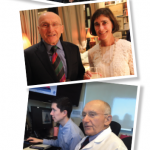
Mascha Tace / shutterstock.com
For many uninsured and underinsured patients in Yuba City, Calif., seeing a rheumatologist used to mean taking a day off from work and driving 108 miles, roundtrip, to the University of California Davis Medical Center.
That changed this year when patients were offered the option of having a telemedicine consultation with a rheumatologist as part a pilot project between the MAVEN (Medical Alumni Volunteer Expert Network) Project and Ampla Health, a nonprofit network of community-based Federally Qualified Health Centers (FQHCs).1
Launched in 2014 by Laurie Green, MD, a San Francisco obstetrician-gynecologist, MAVEN links retired rheumatologists and other specialists to clinics and organizations in underserved communities through telehealth technology.
“Today, one in 15 people in this country receive medical care from local Community Health Centers (CHCs) that specifically serve uninsured, low-income or geographically distanced patients,” Dr. Green says. “Many of these patients receive basic care at CHCs, but specialty medical services continue to be beyond their reach.”
Although the entire country is currently facing a physician shortage, Dr. Green says the lack of qualified physician specialists is expected to become worse in the years to come and to hit rural areas the hardest. A 2016 physician workforce report released last April by the Association of American Medical Colleges (AAMC) found the U.S. will experience a significant physician shortage over the next decade.2 By 2025, the study estimates a shortfall of between 14,900 and 35,600 primary care physicians and a shortfall of between 37,400 and 60,300 physician specialists.
According to the ACR’s 2015 Workforce Study, the demand for rheumatology services is expected to increase by about 27% by the year 2020 and 45% through the year 2025.3 With the soaring patient demand, current and projected figures indicate the rheumatology workforce will be insufficient to meet that demand. The number of rheumatologists available to meet patient demand will likely fall short by about 3,500 full-time equivalent rheumatologists.
Knowing there had to be a better way to provide medical care to vulnerable patient populations, MAVEN hopes to fill in gaps caused by the nation’s physician shortage. Currently operating in California, Massachusetts and Florida, and with plans to expand to other states, MAVEN partners with community health clinics to provide guidance and support, as well as physician volunteers that can work with clinic staff to offer specialty consults to patients.
When MAVEN first launched, Dr. Green and her staff worked to fill the gaps with the millions of patients who enrolled in the Affordable Care Act (ACA). Since the 2016 election, they are monitoring how proposed changes to the ACA may impact those on Medicaid or who receive care at community health clinics.



